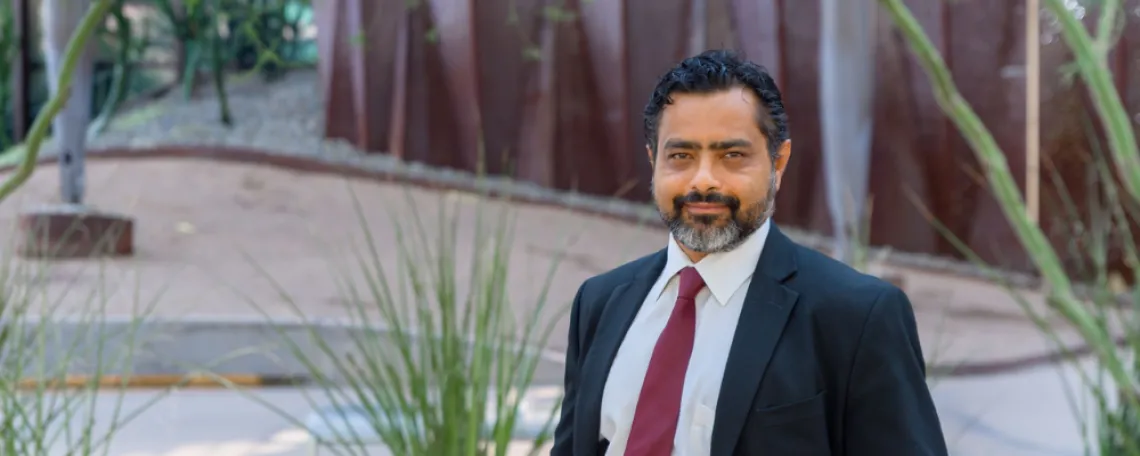Exploring Heart-Brain Connections
Flinn Foundation’s gift to the College of Medicine — Phoenix turns abstraction into action

Just as music theory finds concrete expression in four-part counterpoint and sports analytics become more than data via high-level athletic performance, so does translational research in medicine morph whiteboard thoughts into actionable results.
But in the health sciences, practical application saves lives.
This is what the Flinn Foundation, a privately endowed Arizona grant-maker since 1965, understood in April when it promised an investment of $5.5 million in the University of Arizona College of Medicine – Phoenix (COM-P), to be disbursed over the next five years. The foundation’s gift will support translational research into three of the nation’s most pressing areas of concern: cardiovascular disease, neurosciences and mental health.
The gift will support the college’s multimillion-dollar commitment to develop the Translational Cardiovascular Research Center, a new Department of Translational Neurosciences, and a Center for Pharmacogenetics and Genomics in Mental Health. Recruiting faculty with significant experience is a priority both to support translating research findings into the clinical development of therapeutics and to treat cardiovascular disease, stroke and serious mental illness.
“Gifts from the Flinn Foundation are critical to the research enterprise at COM-P. The Flinn Foundation is interested in funding research aimed at discovering new therapies and treatments for patients. So that fits well with our work, because that’s what all of the researchers in our Center are interested, in too,” says Christopher Glembotski, Ph.D., the inaugural director of the Translational Cardiovascular Research Center. His research in molecular cardiology focuses on identifying new therapeutics for treating ischemic and hypertrophic cardiomyopathies.
“We keep an eye on the mental image of our goal — like athletes who focus on making it to the Super Bowl, or the Olympics, finding the cure for heart disease is always in our minds — that’s where we’re headed. And that’s what everybody in our center is working together to tackle,” Glembotski says.
As part of its strategic plan, the college has prioritized translational research in cardiovascular diseases, neurosciences and mental health to better serve the clinical needs of communities in Arizona.
“We work to translate scientific discoveries made in the research lab into treatments for patients,” he says. Glembotski also is the associate dean for research and values synergy among different research fields.
“Collaboration between research fields can catalyze new discoveries that would not have been made without the interdisciplinary collaborations that are so highly valued at COM-P,” he says. “For example, those of us who do heart research are very interested in collaborating with neuroscientists, because there’s a heart-brain connection we need to better understand. We know that when the heart is failing, the brain knows and is often affected. When the brain is failing, the heart is also affected.
“We’re very interested in learning more about the heart-brain connection, or axis, because we believe it can lead to treatments that benefit more than just the heart or the brain.”
And teaming up with people like Ayman Fanous, M.D., psychiatrist, researcher and chair of psychiatry at COM-P, Glembotski says, “will enhance this collaborative network.”
The CDC estimates that more than 50% of Americans will be diagnosed with a mental illness or disorder at some point in their lives. Serious mental illnesses, such as schizophrenia, bipolar disorder or major depression, affect 1 in 25 Americans. Combatting such serious and prevalent health risks requires a comprehensive approach.
The gift from the Flinn Foundation will allow UArizona researchers to partner with clinical research leaders at Banner – University Medical Center Phoenix, the VA Phoenix Health Care System and Phoenix Children’s to develop new solutions for unmet medical needs.
“The gift from the Flinn Foundation will allow us to recruit a well-established, highly productive researcher in the field of pharmacogenomics and psychiatry,” Fanoussays, “and get results that develop precision medicine modalities, which I believe will be the future of psychiatry.”
Precision medicine, Fanous explains, considers the genetic and environmental factors that influence our health. His greatest hope for the field of psychiatry is that research into therapeutics for mental illness will apply to clinical care. For example, an individual could arrive at a clinic appointment, and their physician could use their genomic information and decision-support tools to determine their best medications.
“Every time I see a patient and get to know the difficulties they go through and the degree to which their illness has sort of robbed them from living a normal life, the more I realize we’re doing the right thing,” he says. “There is so much pain out there that needs to be addressed. We’re able to do a good job in many cases, but we’re not doing enough.”
Getting the right medication based on precision medicine findings in conjunction with high-quality psychotherapy will help lead to better outcomes, he says.
Fanous’ research projects also incorporate minority populations, such as people with ancestry from the African subcontinent and Latin America.
“Our work has an international component to it. The more groups that we study, the more variation we have, the closer we’re going to get to actual results.”
A portion of the Flinn Foundation gift also will provide opportunities for students from underrepresented backgrounds, including a summer internship for minority high school students to work with medical scientists and clinicians. The program will provide mentorship and guidance to help recruit talented students for careers in biomedical research and medicine.
—Matt Morris and Sarah Beaudry

